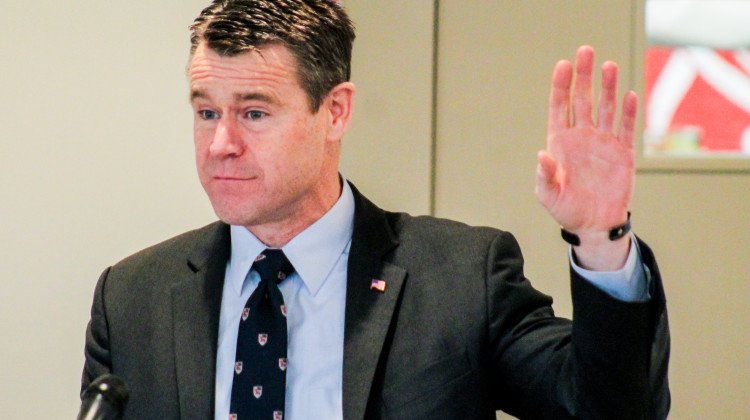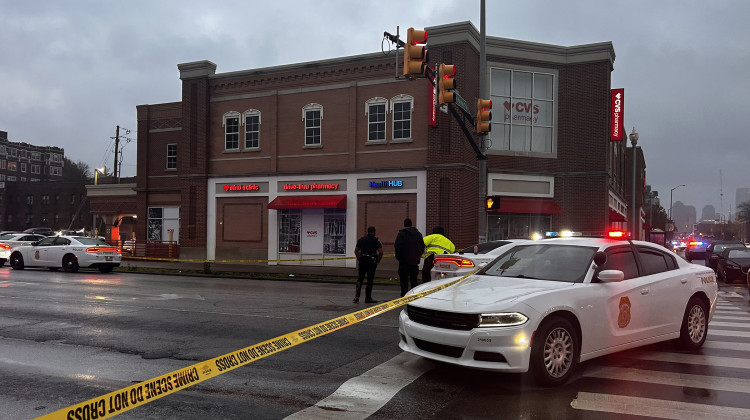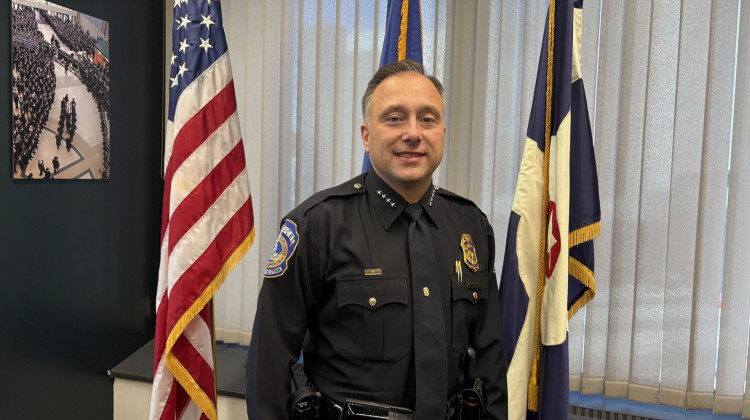
Young adult author John Green spoke to State Sen. Andrea Hunley (D-Indianapolis) at the Indianapolis Central Library as part of an event kicking off national Banned Books Week on Monday, Oct. 2, 2023.
Lee V. Gaines / WFYIIndianapolis author John Green said it’s not the responsibility of a public library to make sure no one is offended by the material on its shelves.
The bestselling storyteller spoke at the Indianapolis Central Library Monday night as part of an event kicking off national Banned Books Week — an annual celebration that promotes the freedom to read and highlights the problem of censorship.
Green recently criticized the Hamilton East Public Library board in suburban Indianapolis for a policy that led to the relocation of nearly 2,000 titles from its teen section to the library’s adult stacks, including Green’s award-winning YA novels “The Fault in Our Stars” and “Looking for Alaska.”
His comments on social media resulted in national scrutiny, and the HEPL board subsequently opted to pause the policy during an August meeting.
Democrat State Sen. Andrea Hunley moderated the Monday night discussion. Hunley and Green discussed the current censorship movement aimed at schools and public libraries, as well as recently enacted laws in Indiana and other states that target transgender children, and Green’s efforts to increase access to life-saving tuberculosis treatments.
Green’s YA novel “Looking for Alaska” was among the most challenged books of last year, according to the American Library Association. Limiting access to information is an age-old strategy to try to control what people think, Green said. But he also expressed confusion — to the amusement of many in the audience — about why his work has been painted as inappropriate for teenage readers.
“I don’t think of my books as being particularly bannable or particularly political. I certainly don't think of them as being erotic,” he said. “I think people who do, it’s just really weird. I don't know what to say to them.”
Green said he’s also an “utter anomaly” among authors whose work is frequently banned.
“Because I am a White man. And the vast majority of books being pulled are by or about people of color, LGBT people, other marginalized communities, and I think that is deeply fear based,” he said.
Green said frequently banned books that explore the lives of marginalized characters are some of the most important books to keep in public libraries — because young people may have no other way to access them. He said he intends to promote the work of marginalized authors and encouraged others to do the same.
“We have to continue to fight to keep these titles in libraries, to keep them in libraries prominently,” Green said.
Green said he trusts trained librarians to decide where books belong in the library, and that the purpose of a library is to allow for equitable access to information — not to appease anyone’s preferences.
“This is an uncomfortable thing to talk about, but ultimately the library does not exist for everyone who uses the library to be comfortable with every book in the library,” he said.
Green also asked Hunley how she works with legislators who advocate for legislation she opposes. She said she tries to push incremental change by finding places of agreement. But Hunley said she stands “fiercely and boldly” in disagreement as well.
“I feel like I need to continue to be the moral compass, I feel like that’s part of the work for sure,” she said.
Green acknowledged that there may be people in the audience who think he’s a pornographer or that he’s grooming children.
“That’s a pretty hurtful and inaccurate thing to say. I think if we’re going to make real progress together, it has to be on some measure learning to assume a position that at least allows for the possibility of a good faith conversation… it is the best way I think to make positive change”
Green did not take any questions from reporters. His contract also barred audio recording of the event.
Indiana’s new law
Earlier this year, Indiana legislators approved a controversial new law that requires public and charter schools to establish a process to allow both parents and community members to challenge books in school libraries that they believe are inappropriate for children. It also requires schools to publicly post their library catalogs. And it bars public school employees from using a book’s educational value as a defense against charges they distributed harmful material to minors.
In an interview with WFYI after the event, Hunley emphasized that the law doesn’t ban books. But she says it’s had a chilling effect; educators are second-guessing what titles they choose to include in schools out of fear of being targeted by anyone who may disagree with the content of a book.
“And most often, those are books that are featuring the stories of people who are marginalized, right, people that are brown, like me, people in the LGBTQ community, right, people who think differently than those who seek to remove their books from the shelves,” Hunley said.
Hunley, a former Indianapolis Public Schools principal, urged educators not to let a vocal minority dictate what information and material students can access.
“What I really hope in my heart of hearts, is that our teachers continue to close their doors and teach,” Hunley said. “I hope that they continue to pull out the books that make kids feel seen, to make them know that their backgrounds and their family structures are valued.”
Contact WFYI education reporter Lee V. Gaines at lgaines@wfyi.org. Follow on X: @LeeVGaines.
 DONATE
DONATE






 Support WFYI. We can't do it without you.
Support WFYI. We can't do it without you.